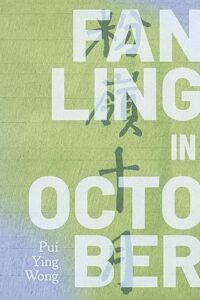A REVIEW OF PUI YING WONG’S FANLING IN OCTOBER
Fanling in October, Pui Ying Wong. Barrow Street Press, 2024. 66 pages. $18.00
by Amy Small-McKinney
Pui Ying Wong’s book of poems, Fanling in October, is both restrained and deeply surprising. She is a traveler, not just across borders, but across history, her own ancestry and that of others, in search of home—past, present, and future. She tells us in her poem, “On the Quay Bercy:”
I was like her once, finding myself
on the verge of a strange city,
no home, no country to claim me,
in damp air and in dim light,
in mercy of the divine unknown.” (37-38)
In these keen observation poems, nothing in the world is perfect, not even a tree. In the poem, “A Tree Grows on the Stone Wall,” tree roots are enmeshed in a wall. The tree must learn:
to love the wall
the way refugees learn to love
their host country
and later:
now it is to make one thing
only, a mural of its own existence.
One decked with hairy roots,
inlaid with moss, ruby ash, and liverwort.
No pedigree, alive with scars. (26-27)
To be alive means making a home, even in the most unlikely of places. For this poet, to be alive with scars is to be fully alive and part of our troubled world.
In the poem, “Bluing,” Wong writes about this country’s ceaseless shootings, using repetition to echo a round of gunshots. Weaving together something as beautiful as a blue sky with bullets flying, and bookending the poem with quatrain refrains, the reader is reminded of how innocence and tragedy are much too connected. The poems begins:
The sky is blue, and bullets fly.
The sky is blue, and bullets fly.
The sky is blue, and bullets fly.
The sky is blue, and bullets fly.
Followed by:
Along a wild river and old villages,
Hung laundry and rubble,
Summer camp and freshwater, bullets fly.
And finally:
The sky is blue.
The sky is blue.
The sky is blue.
The sky is blue. (16)
In the end, even the sky becomes terrifying.
Wong is especially adroit at using leaps. These leaps echo her passage from place to place and her desire for safety. “Day Tripping in Lau Fau Shan,” begins with “shucked oysters” sleeping in “wicker caskets,” then moves us to fishmongers trying to find matches for their daughters and then to how getting rich is so “patriotic” even Mao’s granddaughter doesn’t hide “her billions” and then to how “at the height of his power / Mao swan the width / of the Pearl River,” and finally to men who swam that same river trying to escape Mao. Some “didn’t make the journey // their bodies already blue / when washed up,” returning us to the image of oysters in caskets. (8) It is impossible not to think of migrants today, dying on their journeys to safety, or packed in inhospitable and provisional shelters.
Fanling in October is strewn with place poems. “Be Water,” is located in Hong Kong during the 2019 protests and democracy movement. Be water was a term used by protestors as they moved from neighborhood to neighborhood, their fluidity meant to frustrate police. Wong tells us, “Bauhinias are bedraggled, / bruises” (note her sound work!) and a “bullet misses the boy’s heart / by a fingernail.” (5)
Later, in “On the Quay Bercy,” she takes us to Paris where she spots “the name / of the restaurant boat in Chinese characters” which turns out to be “Lady of Canton,” a replica of a Chinese junk:
Money-red, menstrual-red, red in a river of gray.
My language, my province, though truly,
mine was a castaway island.” (37)
Wong remembers, longs to remember, the chrysanthemums her grandfather “watered and pruned and sighed over / on a dismal day // it’s been half a century. / They shall lift from the clay of memory / into the cay of these lines.” (11) Her use of the word “cay,” highlights the word play woven throughout and the inevitable erosion of delicate memories.
Brief and direct assertions offer nearly hidden glimpses into the poet, often placed at the end of a poem, like “Summer Ended Long Ago”: “The sea said nothing. Nor could I.” (14)
But Wong does say something, does find the words. She is a poet who has quietly and beautifully been producing poems for many years. There is so much to listen for in this stunning book, it asks us to read and read again. Wong asks us to travel with her, to trust her, to be willing to leave things we love behind, as in the title poem, “Fanling in October.” Visiting her weak father in the hospital, she tells us:
Like a nomad I leave behind things,
the window, the bed, jugs of sugar,
the cup I love drinking from. (8)
But Wong also reminds us to embrace the mundane, wherever we live, wherever we end up: “Scan today’s headlines / eat breakfast, / call it habit, call it resiliency / which is a sort of love.”
Amy Small-McKinney was the 2011 Montgomery County PA Poet Laureate. Her second full-length book, Walking Toward Cranes, won the Kithara Book Prize (Glass Lyre Press, 2017). Her chapbook, One Day I Am A Field, was written during COVID and her husband’s death (Glass Lyre Press, 2022). Her newest book & You Think It Ends (Glass Lyre) is due out late 2024 / early 2025. Her poems have been published in the American Poetry Review, The Baltimore Review, Literary Mama, Persimmon Tree, Vox Populi, and Verse Daily, among others and have been translated into Korean and Romanian. Her book reviews have appeared in numerous journals, for example, Prairie Schooner and Matter.

